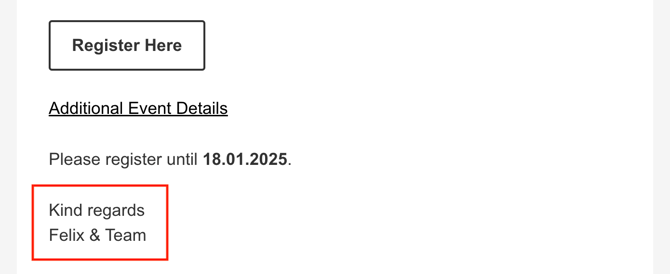Personalized communication
In this article you'll learn how to personalize communication with guests using placeholders and formulas.
Table of contents
Personalization using placeholders
Guest information, like how you'd like to greet the guest, name or number of accompanying persons, can be shown through the use of placeholders.
The following standard guest placeholders are available:
| Description | Placeholder |
| Salutation | {$guest_title} |
| Addition to the salutation | {$guest_titleaddition} |
| First name | {$guest_firstname} |
| Last name | {$guest_lastname} |
| Number of accompanying persons allowed | {$guest_companions_allowed} |
| Number of registered accompanying persons | {$guest_companions_count} |
| Priority | {$guest_prio} |
If you've created custom fields in the registration form, they're also available as placeholders. To learn how to insert placeholders in your communication, see Edit content.
Good to know: Placeholders of user-defined fields in the registration form are not copied over when copying events. Thus, make sure to double check your communication after you've copied the event.
IF/ELSE conditions
Through the use of IF/ELSE conditions, different content can be displayed depending on the characteristics of your guests. For example, IF/ELSE conditions are used to adapt the guest's greeting - whether on a first name basis or with a more formal greeting.
You can find the available properties in the placeholder list. You can find more information about placeholders under Edit content.
Permitted operations
| Operator | Definition |
| == | ...is equal to... |
| => | ...is equal to or greater than... |
| > | ...is greater than... |
| =< | ...is equal to or less than... |
| < | ...is less than... |
IF condition
The IF condition is the simplest condition. It queries the value of a property and displays the content within the condition only if the condition is true.
Example
| Description | Condition |
| Displays an additional text if the guest belongs to the group with priority "1". |
{if="$guest_prio==1"}A small aperitif with an intimate group of guests will be held starting at 16:00. We would be pleased to have you join.{/if} |
IF/ELSE condition
Thanks to the IF/ELSE condition, different content can be displayed depending on whether the condition is met or not.
Example
| Description | IF/ELSE Condition |
| Displays a different text if the guest is allowed to register an accompanying guest. |
{if="$guest_companions_allowed==0"} |
IF/ELSEIF/ELSE condition
Thanks to the IF/ELSEIF/ELSE condition, several cases can be handled within one condition.
Example
| Description | IF/ELSE Condition |
| Displays different greetings depending on the gender of the guest. |
{if="$guest_title==m"} |
Salutations and greetings
Useful greetings in different languages can be found in the table below:
| Description | Condition |
| German (formal) |
{if="$guest_title==m"}Sehr geehrter Herr {$guest_lastname}{elseif="$guest_title==f"}Sehr geehrte Frau {$guest_lastname}{else}Guten Tag{/if} |
| German (informal) |
{if="$guest_title==m"}Lieber {$guest_firstname}{elseif="$guest_title==f"}Liebe {$guest_firstname}{else}Hallo{/if} |
| English (formal) |
{if="$guest_title==m"}Dear Mr. {$guest_lastname}{elseif="$guest_title==f"}Dear Mrs. {$guest_lastname}{else}Hello{/if} |
| English (informal) |
Hi {$guest_firstname} |
| French (formal) |
{if="$guest_title==m"}Bonjour Monsieur {$guest_lastname}{elseif="$guest_title==f"}Bonjour Madame {$guest_lastname}{else}Bonjour{/if} |
| French (informal) |
{if="$guest_title==m"}Cher {$guest_firstname}{elseif="$guest_title==f"}Chère {$guest_firstname}{else}Bonjour{/if} |
| Italian (formal) |
{if="$guest_title==m"}Egregio Sig. {$guest_lastname} {elseif="$guest_title==f"}Gentile Sig.ra {$guest_lastname}{else}Salutti{/if} |
| Italian (informal) |
{if="$guest_title==m"}Caro {$guest_firstname}{elseif="$guest_title==f"}Cara {$guest_firstname}{else}Buongiorno{/if} |
Good to know: Don't use line breaks within your condition to avoid larger spaces before and after the condition.
Signature
In your email templates, you will find a box with placeholders for the signature. You cannot edit the box, but you can show or hide it.
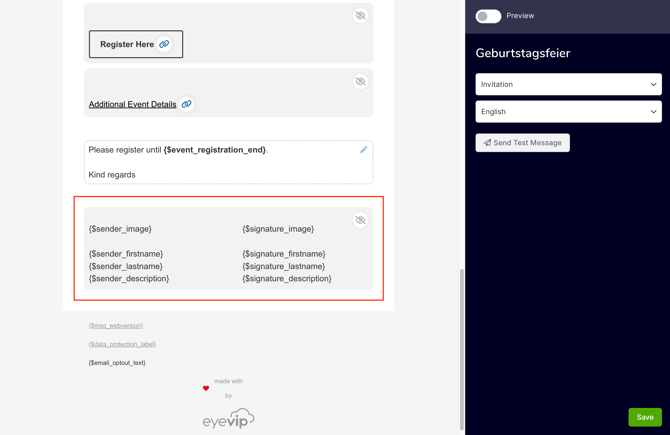
Signature placeholder
The placeholders in the signature box are linked to the fields of the sender that is used for each guest. The sender's name (first and last name), the function (if added) and the image of the signature (if added) are displayed.
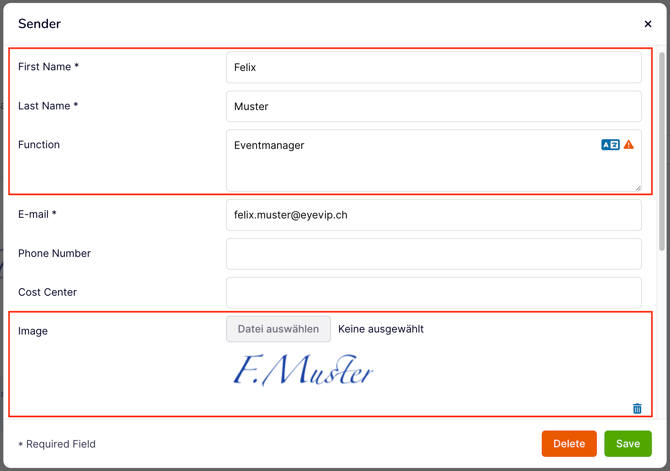
Note: Sender management is not included in every license and not every person who uses eyevip has the permissions to enter or edit senders.
Displaying the signature from a guest's perspective
If the signature box is displayed in your template, the signature will appear to a guest as follows:
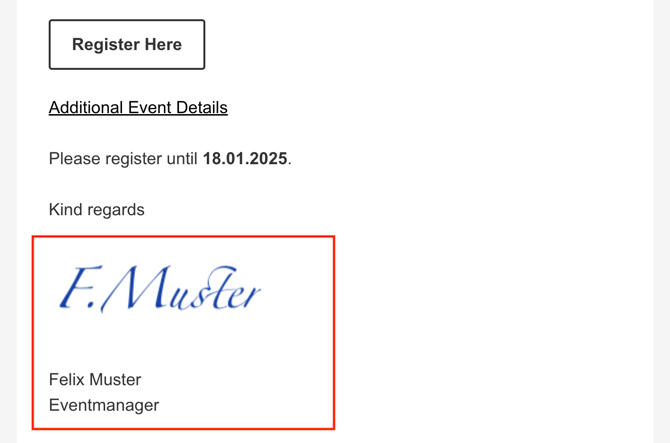
If you are authorized to use multiple senders, you can add a second sender to your guest. The data of the second sender is displayed to the right of the main sender.
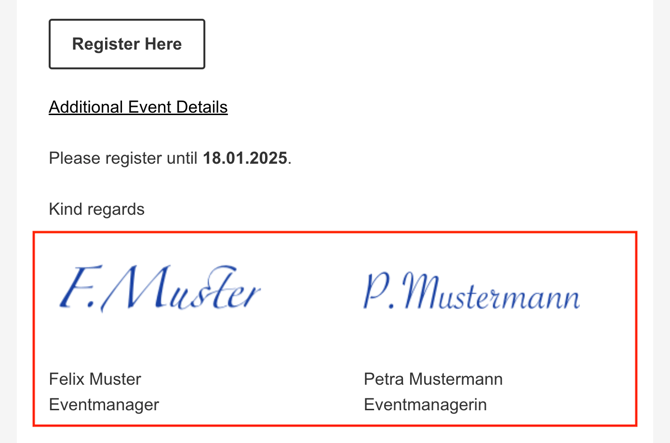
Create your own signature
If you would prefer to create your own signature, use the text box above the signature box. If you do, please remember to hide the signature box. You can find more information under Edit Content.
